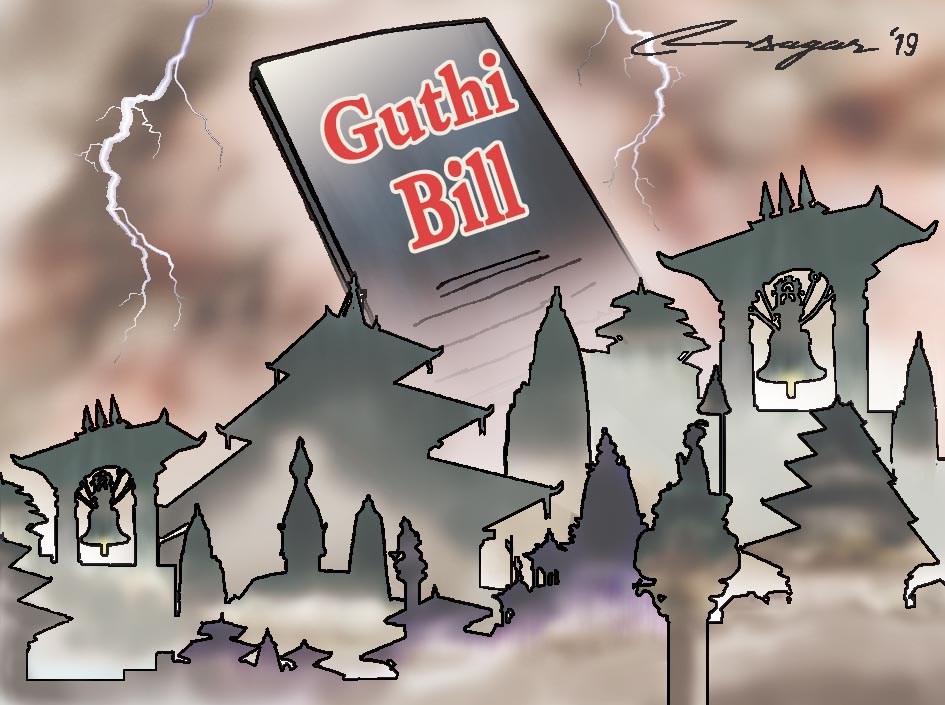Guthi controversy: Do away with it
It is good to monitor and oversee all the guthis in the country and actively work to address the problems facing them. But the government must preserve the age-old traditions and see to it that their originality is not destroyed in the name of modernity
The government has faced massive attacks from diverse sectors of the country. The KP Oli-led two-thirds majority government is under tremendous pressure from all sides as the tall promises of prosperity have yielded so little. The Guthi Bill remains a key issue in today’s political discussion. Thousands of people congregated at the Maitighar Mandala last week, chanting slogans like “Our heritage, our pride”, “Stop the cultural encroachment” and “Our land our right”, demanding the government terminate the controversial Guthi Bill for good. The peaceful rally was held in an organised and responsible manner, reflecting a higher level of consciousness among the organisers and pride over their tradition.
To begin with, a guthi is a social organisation that helps maintain socio-economic order in Newar society, promoting harmony and preventing anarchy. According to the Guthi Sansthan, it was developed as a kind of cooperative, a community organisation. This system was every effective in carrying out social, religious and cultural activities in the past as it set guidelines for service to humanity and society, which cannot be seen from the economic point of view like land and building.
On April 30, Minister for Land Management, Cooperative and Poverty Alleviation Padma Kumari Aryal registered a bill in the Upper House, proposing to form an authority as a modern social corporation that will safeguard its historic entities. It proposed a powerful authority to replace the Guthi Sansthan and nationalise both public and private guthis. The bill, which saw outrage from numerous ethnic communities, especially the Newars of the Kathmandu Valley, shows that the government had not prepared the draft by holding consultations with the local people, stakeholders and experts in this field. Following mass protests, the government has decided to withdraw the controversial bill. However, rather than admitting there were flaws in the bill, a government statement said that ‘people misread the government’s intentions and got misled’.
Lawmakers are divided in the House of Representatives, which does not bode well for the two-thirds majority government. The lawmakers from the ruling party contend that the bill does not bar guthis from conducting activities related to religion, culture and tradition. However, the opposition party says that if the bill is passed as it is, it would dismantle the guthi practice entirely and ultimately destroy the religions, culture and traditions of the country. This controversy has given birth to a dilemma in the political arena.
It is good to monitor and oversee all the guthis in the country and actively work to address the problems facing them. It is also true that the government should respect the diversity of the country and treat all cultures equally. It must preserve the age-old traditions and see to it that their originality is not destroyed in the name of modernity. Religion, culture and tradition are above the state, and no attempt should be made to disrupt them.
Some protestors claimed that the guthis have been in existence even before our country was formed. Some others remarked that from birth to death, guthis play an important role. No doubt, guthis are our cultural and social property. That is why, the state should be accountable, and it is also the duty of every Nepali to protect their identity. So by nationalising the guthis, the state will be erasing our history by wiping out the institutional memory of the indigenous communities.
Social capital is the key foundation for prosperity. It means the network of relationships among the people who live and work in a particular society, which enables that society to function effectively. The numerous monuments, public parks, pilgrim’s rest houses, traveler’s guesthouses, hospitals, schools and many more were built by our ancestors in the true spirit of religion. One of the objectives of a guthi is to run rituals like jatras and parbas, or festivals.
Land donation to a guthi is considered to be a very upright deed and is supposed to provide religious merit, according to Nepali culture. Donation of land to a guthi also gave status in society and was highly respected. It was purely guided by true spirit of humanity and welfare of mankind.
However, guthis are not free from certain shortcomings. The biggest problem it faces is that of encroachment. Lots of guthi land has been encroached and already turned into private land. Secondly, it also must address the rights and welfare of the farmers who till the land. As the bill is linked to our culture, tradition and customs on the one hand and production and farmer’s rights on the other, the government must hold intensive discussion on the bill to address the concerns raised, and make the bill more scientific in the future.
In a nutshell, Nepal is a country rich in heritage and cultural diversity. Guthis not only provide religious and social values but also great pride in terms of the art and architecture of the tangible heritage. So, before drafting the next bill, the government should hold extensive consultations with the stakeholders, local people and experts rather than imposing its will on the people. The government cannot be irresponsible and careless, rather it should understand the people’s sentiments and their passion for their traditions, customs, and social norms and values.






